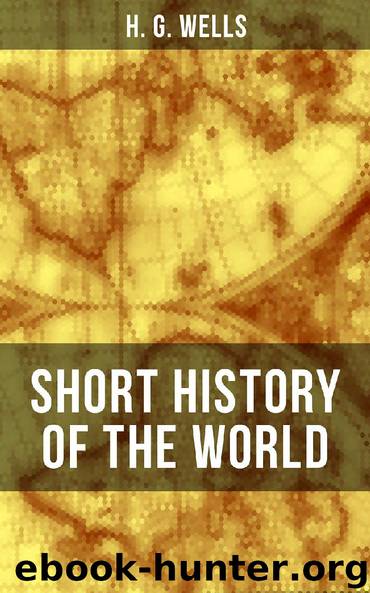H. G. Wells' Short History of The World by H. G. Wells

Author:H. G. Wells [Wells, H. G.]
Language: eng
Format: epub
ISBN: 9788075834058
Publisher: Musaicum Books
Published: 2017-06-09T00:00:00+00:00
XLI
THE BYZANTINE AND SASSANID EMPIRES
Table of Contents
THE Greek-speaking eastern half of the Roman Empire showed much more political tenacity than the western half. It weathered the disasters of the fifth century A.D., which saw a complete and final breaking up of the original Latin Roman power. Attila bullied the Emperor Theodosius II and sacked and raided almost to the walls of Constantinople, but that city remained intact. The Nubians came down the Nile and looted Upper Egypt, but Lower Egypt and Alexandria were left still fairly prosperous. Most of Asia Minor was held against the Sassanid Persians.
The sixth century, which was an age of complete darkness for the West, saw indeed a considerable revival of the Greek power. Justinian I (527-565) was a ruler of very great ambition and energy, and he was married to the Empress Theodora, a woman of quite equal capacity who had begun life as an actress. Justinian reconquered North Africa from the Vandals and most of Italy from the Goths. He even regained the south of Spain. He did not limit his energies to naval and military enterprises. He founded a university, built the great church of Sta. Sophia in Constantinople and codified the Roman law. But in order to destroy a rival to his university foundation he closed the schools of philosophy in Athens, which had been going on in unbroken continuity from the days of Plato, that is to say for nearly a thousand years.
From the third century onwards the Persian Empire had been the steadfast rival of the Byzantine. The two empires kept Asia Minor, Syria and Egypt in a state of perpetual unrest and waste. In the first century A.D., these lands were still at a high level of civilization, wealthy and with an abundant population, but the continual coming and going of armies, massacres, looting and war taxation wore them down steadily until only shattered and ruinous cities remained upon a countryside of scattered peasants. In this melancholy process of impoverishment and disorder lower Egypt fared perhaps less badly than the rest of the world. Alexandria, like Constantinople, continued a dwindling trade between the east and the west.
Science and political philosophy seemed dead now in both these warring and decaying empires. The last philosophers of Athens, until their suppression, preserved the texts of the great literature of the past with an infinite reverence and want of understanding. But there remained no class of men in the world, no free gentlemen with bold and independent habits of thought, to carry on the tradition of frank statement and enquiry embodied in these writings. The social and political chaos accounts largely for the disappearance of this class, but there was also another reason why the human intelligence was sterile and feverish during this age. In both Persia and Byzantium it was all age of intolerance. Both empires were religious empires in a new way, in a way that greatly hampered the free activities of the human mind.
Of course the oldest empires in the world were religious empires, centring upon the worship of a god or of a god-king.
Download
This site does not store any files on its server. We only index and link to content provided by other sites. Please contact the content providers to delete copyright contents if any and email us, we'll remove relevant links or contents immediately.
Sita - Warrior of Mithila (Book 2 of the Ram Chandra Series) by Amish(54897)
The Crystal Crypt by Dick Philip K(36868)
Cat's cradle by Kurt Vonnegut(15357)
Always and Forever, Lara Jean by Jenny Han(14920)
Ready Player One by Cline Ernest(14677)
The Last by Hanna Jameson(10257)
Year One by Nora Roberts(9800)
Persepolis Rising by James S. A. Corey(9374)
The remains of the day by Kazuo Ishiguro(9000)
Never let me go by Kazuo Ishiguro(8900)
Red Rising by Pierce Brown(8786)
Dark Space: The Second Trilogy (Books 4-6) (Dark Space Trilogies Book 2) by Jasper T. Scott(8194)
The handmaid's tale by Margaret Atwood(7766)
The Circle by Dave Eggers(7115)
Frank Herbert's Dune Saga Collection: Books 1 - 6 by Frank Herbert(7090)
The Testaments by Margaret Atwood(6903)
Legacy by Ellery Kane(6659)
Pandemic (The Extinction Files Book 1) by A.G. Riddle(6541)
Six Wakes by Mur Lafferty(6259)
